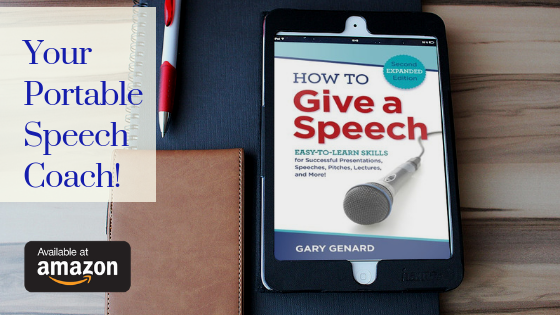Are you happy delivering data when you speak . . . or do you want more? Here's how to be a great speaker who can move audiences every time!
Great public speaking is more than the content delivered, or even the performance. It's a natural synergy involving three forces. Those are 1) the material (and the need it serves), 2) the speaker, and 3) the audience. And like all synergies, it's much more powerful than its component parts.
But to say all of that more simply: the art of public speaking transforms the content for the audience into YOU. Not the other way around, you see. The more you try to become the content you're speaking about, the more boring you will be. Don't you see this play out on a daily basis in speakers who do nothing more than share data?
Reach the level you're capable of as a speaker! Click here to download my Free ebook, High-Impact Speaking: The Leader's Guide to Presenting With Integrity and Influence.
Don't Write Like Shakespeare—Speak Like His Actors
The essence of this argument came home to me recently as I read Peter Thomson's book, Shakespeare's Professional Career. There, on page 83, you'll find this sentence: "The primary task of an Elizabethan actor was to deliver a story and to retain the attention of the audience by delivering it effectively."
Simple, and simply true isn't it? To adapt that to public speaking, I would add something about understanding the needs of the audience. Otherwise, I don't see much daylight between that description of acting in Shakespeare's time and what we need to do in our pitches and presentations. Do you?
Do you have what it takes to be a dynamic speaker? Find out in my Free ebook, 12 Easy Ways to Achieve Presence and Charisma.
The 'story' aspect really means putting your content into a narrative that features human beings so that it makes sense to listeners. Public speaking audiences are no less interested in a stirring rendition of otherwise dry facts than Elizabethan playgoers!
So, you see, it all comes down to you. Data succeeds very nicely at its task, and is hopeless at performing your task, which is conveying the meaning of what you're saying and its significance. Here's another sentence from Thomson, and believe me, when it comes to performance, it's an amazing one: "The plays depend on the spectacular occupation by actors of an empty stage."
The spectacular occupation. That doesn't mean standing and delivering lines (like reading a speech at a lectern). And it doesn't involve sleepwalking through a performance without intense personal involvement (like reading off a spreadsheet or slides instead of weaving the data into an interesting narrative). What the Elizabethan actors accomplished was to occupy the stage in a spectacular way—in other words, to give the audience the right kind of spectacle. In a bare, open-air stage featuring plays performed in daylight, that meant an exciting conjunction of text, costumes, and personal performance.
Great speaking is always about connecting with an audience. Learn how! Get my Free resource, "Great Speaking? It's About Performance Over Content."
A Modest Proposal for Spectacular Speaking
You can speak just as spectacularly as those actors, through your own interesting "occupation" of your performance space. (Costumes are optional. See your company's employee handbook.)
Here's my modest proposal for how you can do so: Stop focusing on your content a lot earlier than you do now. If you're thinking, "I never stop focusing on my content," this is all the more reason why you should listen, provided of course that you really want to become a memorable speaker.
Focus is a key element of speaking effectively . . . provided it's the right focus. Learn more in my Free cheat sheet, "Leadership Skills: 10 Focusing Techniques for Public Speaking."
Remember that your job when you present is never to deliver information—it is always to influence your audience. Naturally, you use information to do so. But you have a much more powerful tool at your disposal: you. To use this tool to its greatest potential, come to this understanding: you already have content (i.e., subject matter knowledge) coming out of your ears. It's your skill and comfort level at commanding an audience that is probably weak. That, then, is the area you should work on as you prepare to speak.
Can You Move an Audience? The whole success in any speaking engagement hinges on the ability of the speaker to connect with and move the audience—by informing, persuading, inspiring, motivating, whatever. Isn't that the skill you should always be trying to improve as a speaker? To help in this effort, I suggest you say to yourself at some point: "Enough. My content and preparation are solid, and I'm ready with this material. Now let me spend time reminding myself of who my audience is, what they need, and what they expect. Let me think carefully about how I can live in their world and make everything I'm about to say resonate with them."
Thomson talks about Shakespeare’s “perception of the histrionic temperament in action,” that is, by watching the actors in his company.[1] For you, it needs to be the speaking temperament in action. That's the combination of solid content and a great performance that links you with your audience.
Spectacular!
[1] Source for the quotes in this article: Peter Thomson, Shakespeare’s Professional Career (Cambridge: Cambridge University Press, 1994).
You should follow me on Twitter here.
SPEAK TO BE HEARD — 101 Powerful Speaking Tips! Click on the image below.
Gary Genard is an actor, author, and expert in public speaking training and overcoming speaking fear. His company, Boston-based The Genard Method offers live 1:1 Zoom executive coaching and corporate group training worldwide. In 2021 for the eighth consecutive year, Gary has been ranked by Global Gurus as One of the World’s Top 30 Communication Professionals. He is the author of the Amazon Best-Seller How to Give a Speech. His second book, Fearless Speaking, was named in 2019 as "One of the 100 Best Confidence Books of All Time." His latest book is The Online Meetings Handbook, now available at The Genard Method and at Amazon. To know more about TGM's services, Contact Gary here.






